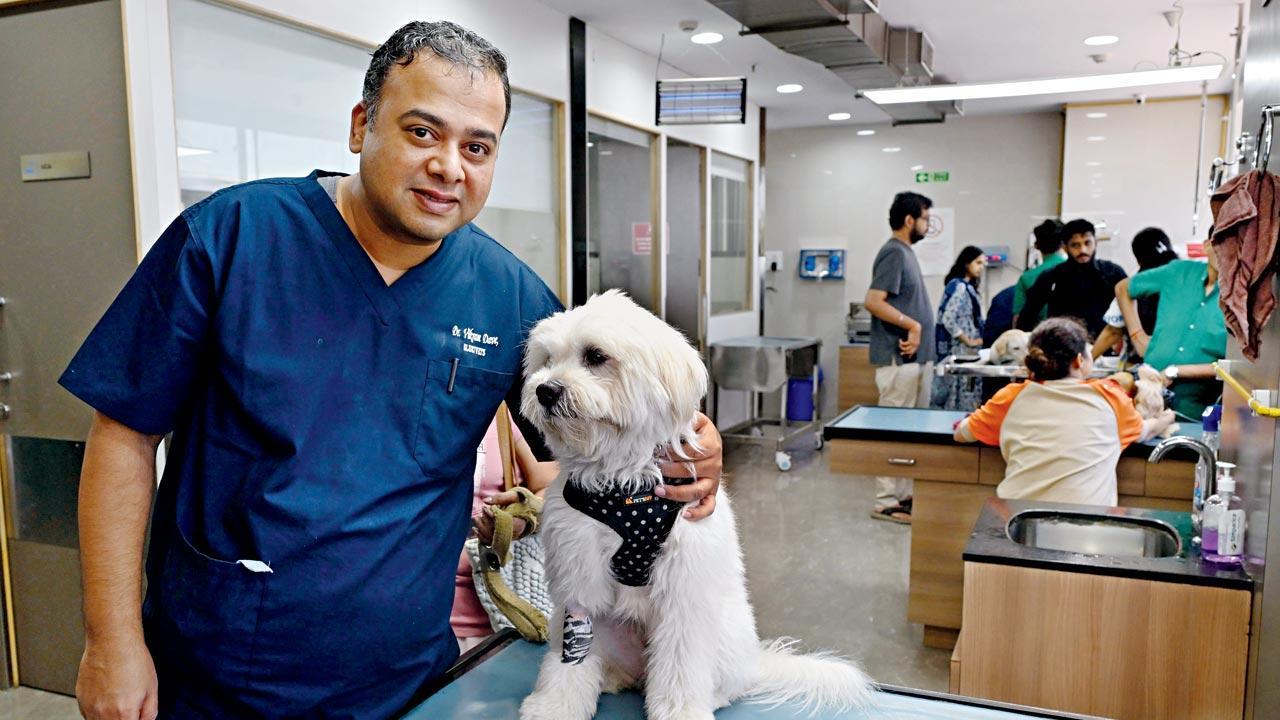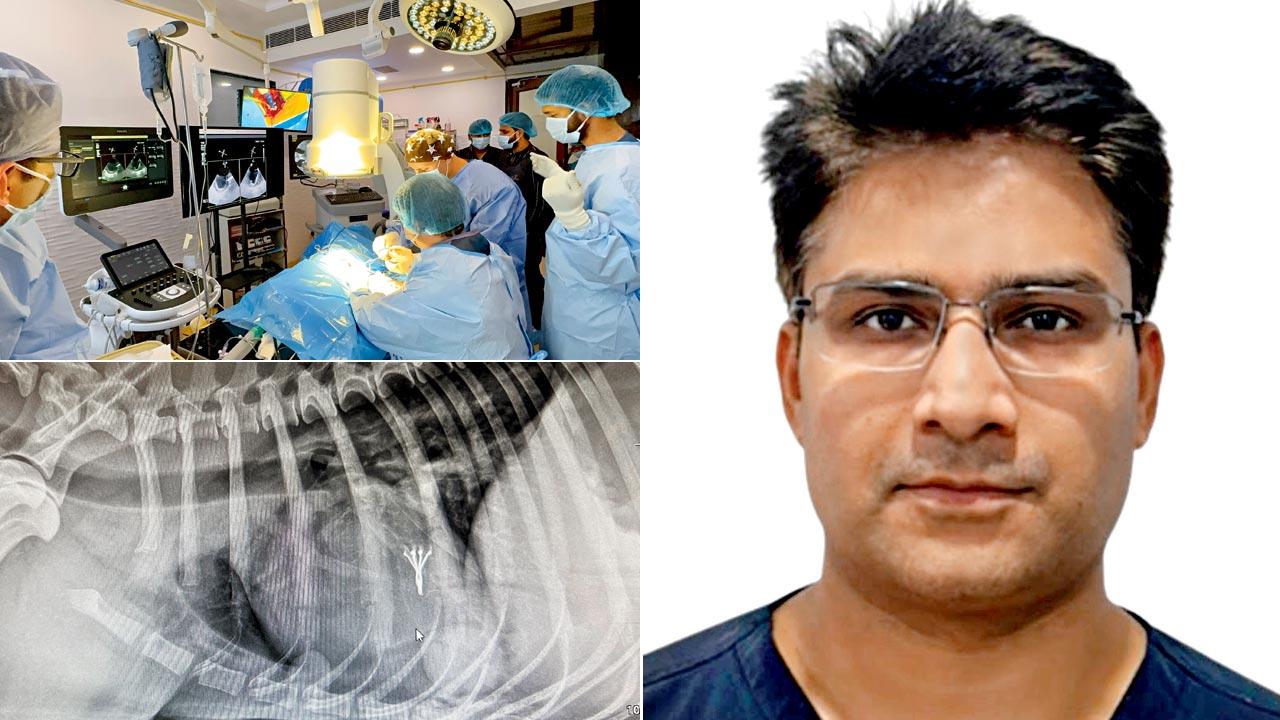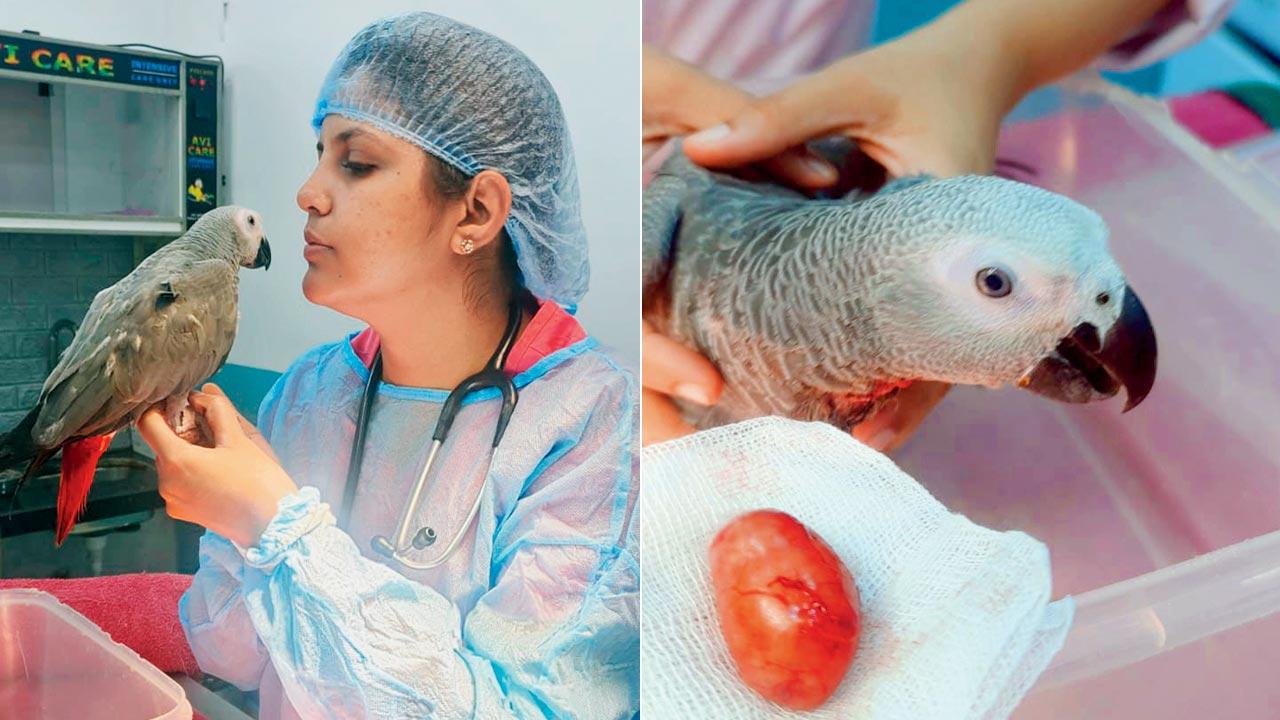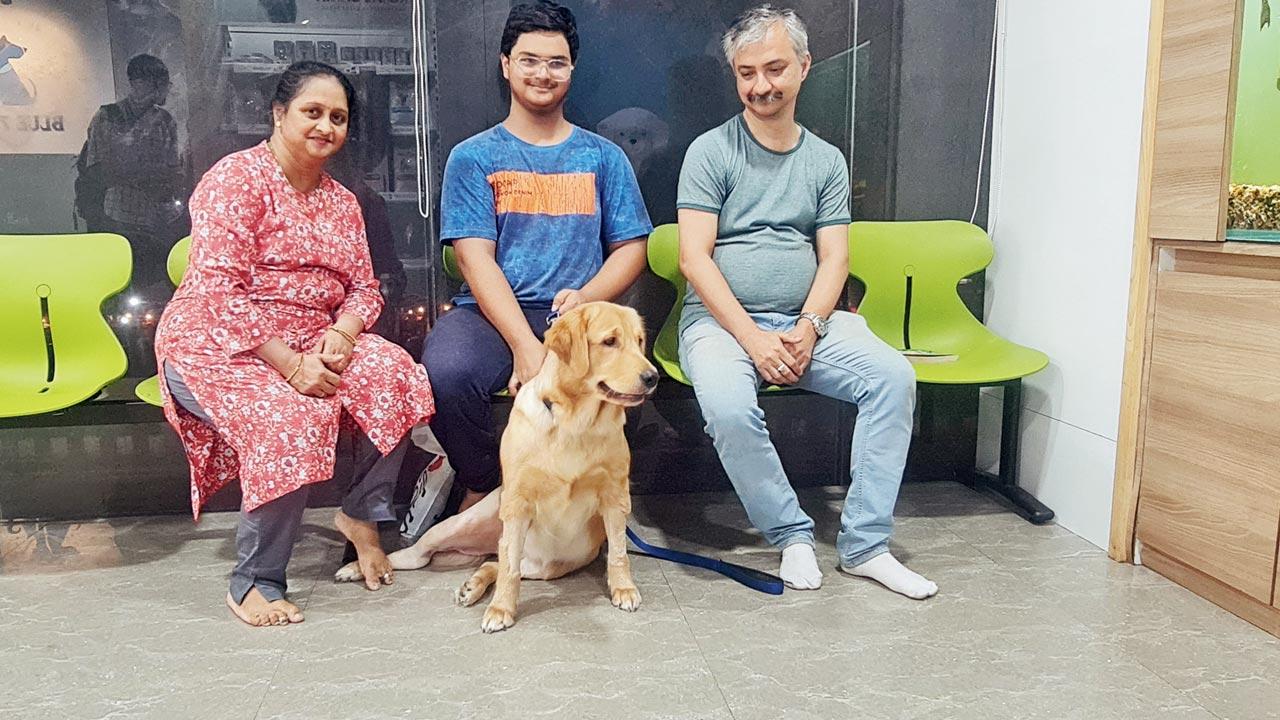In never-done-before surgical procedures in India, trail blazing veterinarians are placing hip implants and aortic valves in dogs, cats and birds

Dr Vikram Dave attends to a canine patient with an injured leg at Blue 7 Vets clinic in Borivli. He is the first in the country to pull off a total hip replacement on a dog. Pic/Nimesh Dave
Barely five years ago, a thyroid tumour would have been a death sentence for Shiva, an African grey parrot. Lucky for this bird and his pet parent, Chirag M Desai, veterinary science in India has since advanced by leaps, and what would have once been a fatal diagnosis, is now treatable.
When the Surat-based architect brought Shiva to Dr Rina Dev’s animal and bird clinic in Bandra West, even after all her experience with exotic pets, she was surprised to see the parrot, who was less than a year old and weighed under half-a-kilogram, tottering under the weight of a table tennis-sized mass on his neck.
In a first-of-its-kind surgery in the country, Dr Dev successfully removed the 33g lump from Shiva’s neck. A thyroid mass removal procedure had never been attempted before in India due to the complex nature of the surgery, made even more challenging by the minute scale of a bird’s physiology.
 Dr Bhanu Dev Sharma performs a first-of-its-kind, minimally invasive cardiac surgery on a dog in Delhi; the procedure involves implanting a valve clamp inside the heart through a 5-cm incision in the chest
Dr Bhanu Dev Sharma performs a first-of-its-kind, minimally invasive cardiac surgery on a dog in Delhi; the procedure involves implanting a valve clamp inside the heart through a 5-cm incision in the chest
CT scans revealed that the growth was in a tricky position, pressing down on both the windpipe and foodpipe, and uncomfortably close to the jugular vein and carotid artery—the two main blood vessels that carry blood to and from the heart. “The mass was growing aggressively; in a matter of months, it had gone from pea-sized to baby potato. The bird had stopped vocalising, there was pressure while breathing and swallowing,” says Dr Dev, adding, “The surgery was tricky considering that the growth was connected to the trachea. Besides, the bird was so tiny and the lump, big. If you think paediatric surgeries are challenging, wait till you see a micro-surgery at this scale.”
For Desai, Dr Dev’s surgical expertise was a godsend. “I had taken Shiva to so many vets in Surat, then one vet told me to go see Dr Dev—only she could pull off this surgery in India,” he recalls. Desai says the procedure cost R60,000—which some might consider an eye-popping figure to spend on a bird—but it was worth it for the architect. “If Dr Dev hadn’t attempted the procedure, Shiva would have died a slow, painful death. If there was a way to save him, why would I let him go? He is not just a ‘bird’ for me; I brought him into my home and life, and I will do what it takes to save him,” he says.
Desai is not alone in this sentiment; Indians are now willing to spend even lakhs, now that veterinary science is finally on its way to catching up with advancements in the West.
 Dr Rina Dev with Shiva, an African grey parrot who underwent surgery at her Bandra clinic for removal of a life-threatening lump in his neck; a 33g mass the size of a baby potato was extracted from the 415 g exotic pet
Dr Rina Dev with Shiva, an African grey parrot who underwent surgery at her Bandra clinic for removal of a life-threatening lump in his neck; a 33g mass the size of a baby potato was extracted from the 415 g exotic pet
Just last fortnight in Delhi, a seven-year-old beagle with a life-threatening cardiac condition underwent the country’s first minimally invasive heart surgery that has prolonged her life from the earlier prognosis of six months to two years, to a full lifespan (12-14 years on average).
The beagle, Juliet, was in stage C of C-mitral valve disease, which causes backflow of blood in the heart, further resulting in breathing distress, exercise intolerance and coughing fits.
In a novel 1.5-hour procedure, Dr Bhanu Dev Sharma, director at Max Petz Hospital in Delhi, performed a transcatheter valve repair by making a 5-cm cut in the chest, through which he inserted a catheter and implanted a clamp on the malfunctioning valve.
 Maple, who was the first dog in India to undergo a total hip replacement, with her family at Dr Dave’s clinic in Borivli, for a post-operative check-up
Maple, who was the first dog in India to undergo a total hip replacement, with her family at Dr Dave’s clinic in Borivli, for a post-operative check-up
This is not the first heart surgery on a dog in India—that distinction goes to an open heart surgery that was performed closer home, at Andheri’s Top Dog clinic, by Dr Makarand Chousalkar last year, with the help of German experts specially flown in.
However, the transcatheter procedure is unique because it is performed on a beating heart, unlike an open heart procedure in which the heart and lung function are taken over by a bypass machine, says Dr Sharma, adding, “This reduces both the surgical risk, as well as recovery time. Juliet was discharged in two days, with her earlier distress already having nearly disappeared.
The cutting-edge procedure has only been pulled off a handful of times globally, and Dr Sharma was the first private practitioner in Asia to attempt it. “This is a super-specialty procedure; it is similar to the mitral clip procedure that has saved many human lives. Mitral valve disease is the most common cardiac ailment among dogs, and with this option now open to dogs, it will bring hope to many pet parents,” he says.
The entire procedure cost around Rs 8.5 lakh, compared to Rs 12-15 lakh globally, says the Delhi vet, adding that the implant alone costs USD 6,000 (about Rs 5 lakh). The hefty cost doesn’t deter pet parents, asserts Dr Sharma. “Things are quite different now compared to 20, or even 10 years ago. There is now more awareness about pet health among families and many of them consider pets as their children, especially the double-income, no-kids couples, who will go to great lengths for their dogs,” he explains.
If mitral heart disease is one of the most common cardiac conditions among dogs, another silent killer is hip dysplasia (HD), which is abnormal formation of the hip socket, causing much pain and resulting in arthritis and lameness in extreme cases.
While reparative surgeries have been performed in India for a few years now, they are not a curative solution, as they rarely bring the dog back to full function and there can still be further wear and tear of the joint. However, Dr Vikram Dave from Borivli-based Blue 7 Vets is leading the charge in the country with a more radical solution: total hip replacement (THR) surgery.
Dr Dave, who has trained in the super-specialist procedure in Russia, first attempted it in Mumbai in July last year on golden retriever Maple, who was diagnosed with HD at just six months. Her litter-mate Loki, too, underwent the same procedure in December.
“Hip problems in pedigree dogs are at an unprecedented level these days, mostly due to inbreeding, smooth floor tiles in homes and lack of exercise. We see symptoms of pain in dogs as young as three to six months of age. We see one-year-old dogs who are not even able to get up properly,” says Dr Dave.
“THR has been performed abroad for the last 15 years, and it was something we were lacking in India. The problem is that hip replacement is a costly affair. The procedure costs R3.5 lakh, of which R2.5 lakh is spent just on the implant, which we have to source from outside the country. And pet insurance is yet to take off in India, so it’s a hefty cost for families,” the expert says.
The high cost and lack of insurance notwithstanding, pet parents are queuing up for the procedure. “In the last three months alone, we have performed 12 hip replacements. At this rate, we will be doing two to three such surgeries every week. There is a lot of interest from families, because HD is a rampant problem,” says Dr Dave, who is also the first in the country to have performed a complex procedure called Patella Groove Replacement, which involves implanting a prosthesis to give relief to dogs with arthritic knees.
If anything, Maple and Loki’s ‘dad’, architect Kapil Bakshi was relieved that there was an option to provide relief to their furry ‘children’. “Because Dr Dave came up with this surgical plan, we at least had a way to end the pain for our dogs. Both of them were diagnosed with HD at such a young age, we can’t imagine how much pain they would have been in as they grew older. Now they can run, jump and play with no problems,” he says.
Insurance companies are grossly underestimating the size of the market, and there would be many takers for pet health policies in the country, says the Borivli vet. “People are willing to invest in their pets’ health now. We get families who have spoken to us about the possibility of paying for the surgery in installments, or taking out a loan for it,” he adds.
Not unlike human cases, the word cancer can strike terror in the hearts of pet parents as well. But Chembur-based Dr Noopur Desai is making strides in the field, setting up one of the first oncology-specialist vet clinics in the country. Apart from conventional radiotherapy, her set-up The Cancer Vet also offers cutting-edge stereotactic radiation—very precisely targeted, high-dose radiation that studies found to be effective on brain, nasal and prostate tumours, and other cancers.
“Because it is so precise, higher doses can be administered, thereby cutting rounds of treatment from 20 in conventional radiotherapy, to just five with stereotactic radiation. Not only does this reduce side effects, but it also means that the dog will not have to be put under general anaesthesia multiple times, further reducing risk,” says the oncologist.
The procedure was available in the US for nearly a decade, but was only brought to India three years ago by Dr Desai, who moved from the US and began her practice here. She remains the only vet in India to provide this highly specialised treatment option.
In Pune, Dr Narendra Pardeshi has a cat patient, Kuttush, whose family hopes to save his life with a kidney transplant—a procedure that has never been attempted in India. In March, Dr Pardeshi had hoped to carry out the country’s first kidney transplant on a dog, and had even found a donor match. Unfortunately, by the time permissions from animal welfare bodies and organ transplant authorities came through, the dog had died.
With all permissions in place this time round, all that remains is to look for a donor for Kuttush, he says.
Asked about concerns that organ transplant procedures could open up an ethical quagmire in the future, with no regulatory body to oversee where animal organs can be sourced from, Dr Pardeshi says that vulnerable populations such as stray animals and those in rescue shelters are well-protected by hawk-eyed welfare workers.
“We are also searching only for pet parents who will volunteer their cats as live donors,” Dr Pardeshi clarifies.
 Subscribe today by clicking the link and stay updated with the latest news!" Click here!
Subscribe today by clicking the link and stay updated with the latest news!" Click here!










